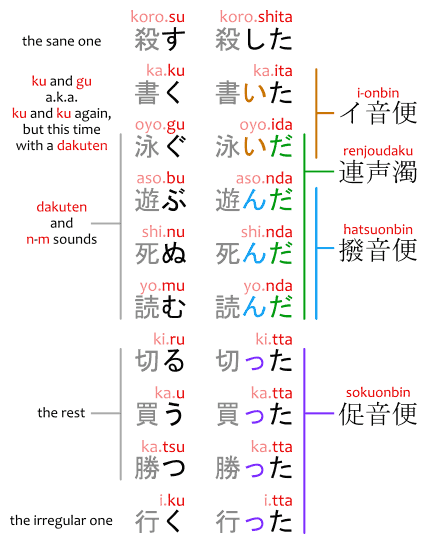For example: nado など, "et cetera," comes from nani-to なにと, or nanto なんと. While shinda 死んだ, "died," comes from shini-ta 死にた.
Definition
In essence, renjoudaku works the same way as rendaku. The difference is that rendaku only changes the first syllable of a suffix, while renjoudaku merges the sounds together.To elaborate: rendaku makes the suffix easier to pronounce after a stem that's full of hard syllables. For example, shini-kami しにかみ becomes shini-gami しにがみ, "god of death."
Meanwhile, renjoudaku happens when you have a nasal sound, like n ん, nu ぬ, mu む, or a a voiced sound, which is any syllable that already has a diacritic, like gu ぐ, bu ぶ, and so on, and it merges this sound with the one following it.(肥爪, 2003:107)
Overwhelmingly, rendaku is more common than renjoudaku. The word renjoudaku isn't even in the dictionaries. There's no Wikipedia article about renjoudaku, either.
Furthermore, note that there's a third thing, renjou 連声, which happens when you have a nasal stem plus a vowel in the suffix.
連用形
Basically the only place where renjoudaku is relevant at all is with the ren'youkei 連用形 form of godan verbs. When verbs in the ren'youkei form connect to the jodoushi 助動詞 ta た and te て, to create the past form and the te-form respectively, sometimes they suffer renjoudaku, sometimes not.But that's not all, this ren'youkei form is also riddled with other changes in pronunciation: the i-onbin イ音便, sokuonbin 促音便, and hatsuonbin 撥音便, which add an i い, a sokuon 促音, represented by the small tsu っ, and a hatsuon 撥音, which is the term for the nasal n ん.
For reference:(肥爪, 2002:101)
- kaku, kaki-te, kaite
書く, 書きて, 書いて
To write. (i-onbin.) - tsugu, tsugi-te, tsuide
継ぐ, 継ぎて, 継いで
To succeed. To inherit. (i-onbin, renjoudaku.) - tatsu, tachi-te, tatte
立つ, 立ちて, 立って
To stand. (sokuonbin.) - shinu, shini-te, shinde
死ぬ, 死にて, 死んで
To die. (hatsuonbin, renjoudaku.) - kau, kai-te, katte
買う, 買いて, 買って
To buy. (sokuonbin.) - yobu, yobi-te, yonde
呼ぶ, 呼びて, 読んで
To call. (hatsuonbin, renjoudaku.) - yomu, yomi-te, yonde
読む, 読みて, 読んで
To read. (hatsuonbin, renjoudaku.) - toru, torite, totte
取る, 取りて, 取って
To take. (sokuonbin.)
Beyond the above, some yodan verbs can also get an u-onbin ウ音便, which adds an u う.
- kafu, kahi-te, kaute
買ふ, 買ひて, 買うて
To buy. (u-onbin.)
- yobu, yobi-te, youde
呼ぶ, 呼びて, 呼うで
To call. (u-onbin, renjoudaku). - yomu, yomi-te, youde
読む, 読みて, 読うで
To read. (u-onbin, renjoudaku.)
In the conjugations above, the only verbs that were affected by renjoudaku are those whose ren'youkei forms ended with ~ni ~に or ~mi ~み, which are nasal sounds, and those that had a dakuten to begin with: ~bi ~び and ~gi ~ぎ.
As mentioned before, this also applies to the ~ta ~た jodoushi, which creates the past form. For example: shinda 死んだ, "died." not shinta 死んた.
Source: japanesewithanime.com (CC BY-SA 4.0)
Similarly, it also affects the conditional ~tara ~たら form, which is related to ~ta ~た. For example: shindara 死んだら, "if died," not shintara 死んたら. And the ~tari ~たり form, also related, shindari 死んだり.
However, it doesn't affect the desiderative ~tai ~たい form, because ~tai ~たい is somehow unrelated to ~ta ~た. For example: shinitai 死にたい, "[I] want to die," not shinidai 死にだい.
Other Words
The renjoudaku affects words besides the ren'youkei form of verbs. However, I've got only a few examples of that, and most of them are some really old words.I'm putting them here for reference anyway:(肥爪, 2003:107)
- kaubashi
かうばし
Fragrant.- From ka-kuhashi 香細し.[かぐはし - ja.wiktionary.org, accessed 2019-11-10]
- kaguhashi
かぐはし
(this is rendaku.) - kaubashi
かうばし
(this is renjoudaku.)
- waraudzu
わらうづ
A kind of sandal made out of straw.- wara-kutsu
藁靴
Literally: straw-shoe. - waragutsu
わらぐつ
(this is rendaku.) - waraudzu
わらうづ
(this is renjoudaku.)
- wara-kutsu
- toji
刀自
Lady.- 刀自 is ateji. Originally to-nushi 戸主.[刀自 - 大辞林 第三版 via kotobank.jp, accessed 2019-11-10]
- to-nushi
とぬし - toji
とじ
- kiji
雉
Green pheasant. (a bird.)- kigishi
きぎし - kiji
きじ
- kigishi
- obosu
おぼす
To feel.- Synonymous with omou 思う.
- omohosu
おもほす - obosu
おぼす
- nado
等
Et cetera. And so on.- nani-to
なにと - nado
など
- nani-to

No comments: